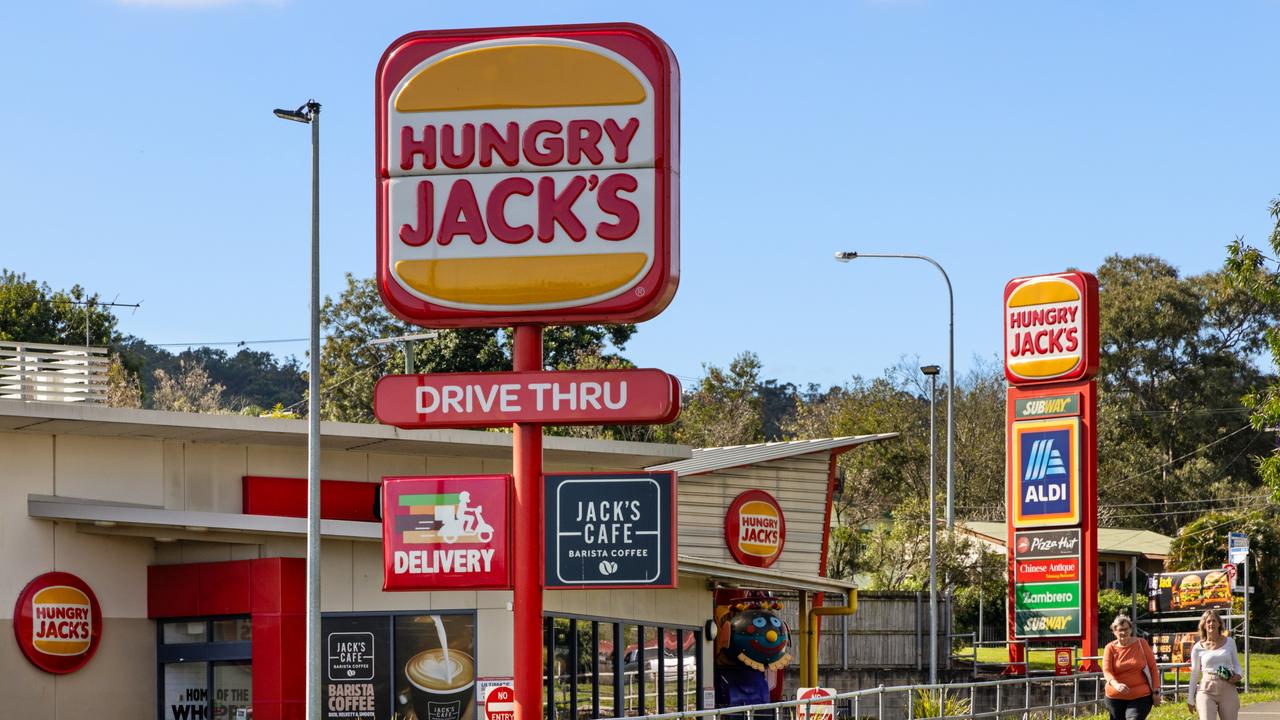‘Our numbers skyrocketed’: The Qlders who made a fortune during the pandemic
Covid has wreaked havoc on countless businesses but some with the right product and the right outlet have thrived to create multimillion-dollar operations.

News
Don't miss out on the headlines from News. Followed categories will be added to My News.
It was all action at the Muscle Nation warehouse as one of the biggest days on the young business’s calendar loomed closer.
Trucks were in the driveway and boxes of protein powders, muscle singlets and the wildly popular “scrunch bum” leggings were being loaded by excited workers.
After six months of planning and stumping up hundreds of thousands of dollars, a 30-person team and a host of athletes was headed to Melbourne the next day, bound for the Schwarzenegger-inspired Arnold Fitness Expo.
Then came the call. The expo was off. State borders were closing. Covid-19 had arrived.
“And we were like, ‘What? This is legit? This is actually becoming a thing’,” recalls Demi Anthony, 26, Muscle Nation’s operations manager, of that day in late March 2020 when the enormity of the emerging crisis dawned.
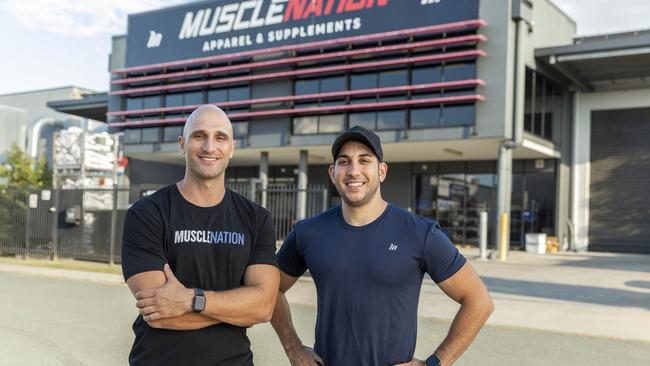
The shivers that went through every business hit Muscle Nation’s founders, Demi’s husband, Nathaniel Anthony, 31, and Chris Anastasi, 37.
They’d created the online Muscle Nation less than four years earlier, building a social media following and client base for its exercise gear and supplements that had led to an $11m turnover in 2018-19.
They’d moved their stock out of Nathaniel Anthony’s grandma’s house and into the new Tingalpa warehouse, in Brisbane’s east, had 30 full-time staff and a new collection about to launch. Was their buff young business about to go pear-shaped?
On the day of the launch, Anthony was glued to the website.
“I can generally tell as soon as we launch if we’re ahead or not by the amount of traffic on the website and how quickly the orders are coming in,” he says.
The numbers went up. And up. At each ensuing monthly launch, the results were better than the month before.
“Our numbers just doubled and tripled and skyrocketed from the same time the previous year,” he says.
Muscle Nation was emerging as one of those businesses that didn’t just survive Covid, it thrived.

For all the heartache the pandemic has caused, for all the business owners who are still juggling cashflow, reducing staff or shutting shop as the Omicron wave surges through, there are those that had the quinella: right product, right outlet.
Consumers knew what they wanted. We really wanted pizza. Or fried chicken.
Two of Queensland’s ASX-listed companies, Domino’s Pizza and Collins Foods, owners of KFC and Taco Bell, rebounded significantly from the Covid-19 nadir of March 23, 2020, with Domino’s shares increasing 129 per cent and Collins up 175 per cent.
Getting outdoors became an obsession, with car, boat, motorcycle and caravan sales growing strongly, albeit with supply issues.
The Gold Coast-based Riviera, a luxury motor yacht building company that has been in and out of receivership, ended last year with a wet sail, experiencing record-breaking demand from local and overseas markets.
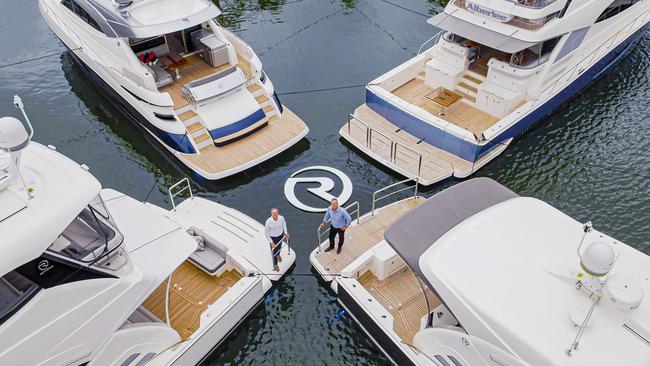
Newstead’s Eagers Automotive recovered from its March 2020 slump to record a share increase of 326 per cent and Strathpine’s Super Retail Group – with its BCF, SuperCheap Auto, Rebel and Macpac brands – rose 197 per cent.
As lockdowns came and went across Australia and the prospect of hitting the stores grew less attractive, we became keyboard shoppers. Customers who had never bought online took the plunge.
The Australia Post eCommerce Industry Report 2021 found that another one million additional households shopped online every month in 2020. Internet shopping grew 57 per cent on the previous year, eclipsing 2019’s growth in the space of eight months.
This dramatic shift to online put the young guns of ecommerce in pole position. Tech and social media savvy millennials have seized their moment and, despite challenges, are pushing through the pandemic stronger.
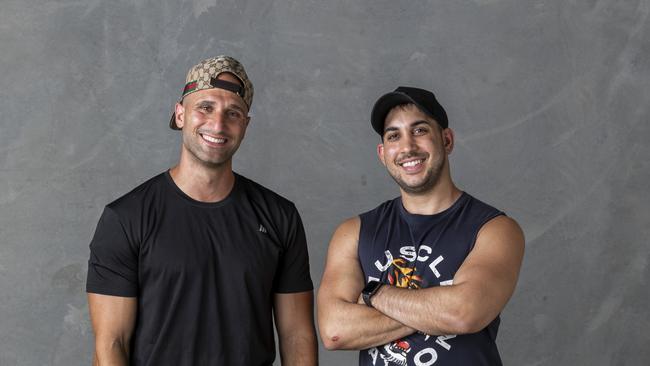
Muscle Nation blitzed 2019/20 with a $27.5m turnover, increasing to $50m the next year. They’re aiming to smash past $70m this financial year.
“People are staying online,” Nathaniel Anthony says. “And when we get a customer, we try to do everything we can to make them a repeat customer. We bring them into our community, nurture them.”
Adds Demi: “And then we give them something new to purchase.”
OH MY DOG!
Have a plan, hold it loosely.
That’s the mantra Emma Karanges, 33, and Jasmin Robertson, 35, have repeated as they’ve battled the vagaries of business in a pandemic.
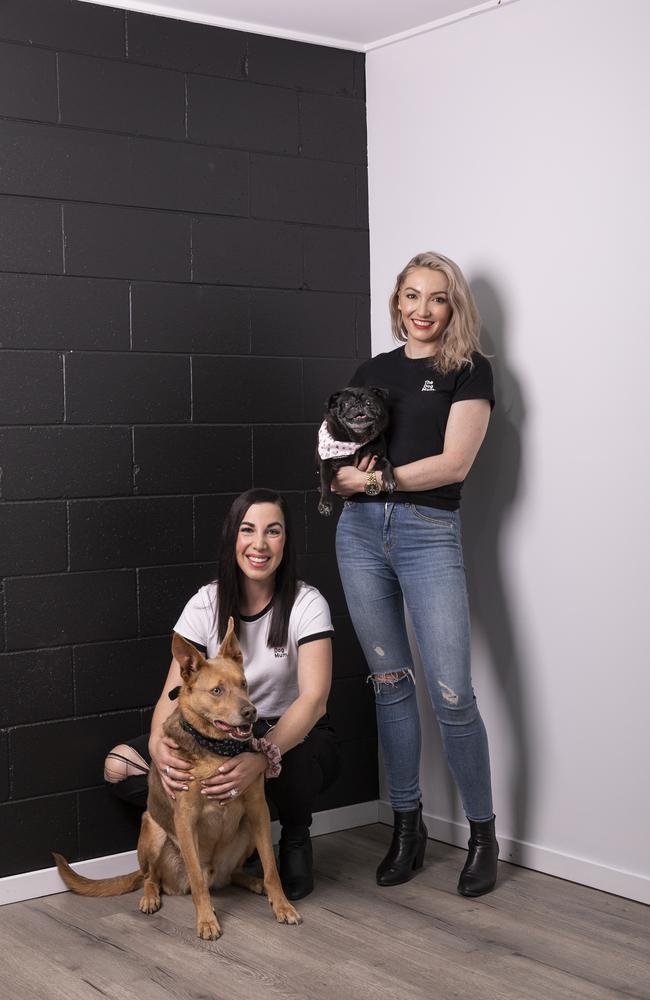
Like the time the summer sleepwear range they’d expected to arrive from overseas in November 2020 was held up by Covid-related factory closures and freight delays. It finally lobbed as winter was biting in June last year.
“So, we launched, creatively,” says Karanges.
“We brought in Ugg boats for the photo shoot, added a hoodie, so it was cute. We just had to adapt quickly and go, ‘Right, this is the situation, we’re going with it’.”
They are The Dog Mum, an online shop celebrating our obsession with our dogs but with a twist: the bulk of the puppy-themed range is not for the pooches, but the owners.
It began in July 2017 when Karanges, then a marketing and public relations lecturer at Queensland University of Technology, was helping her husband Dan sell his DK Stainless dog bowls at a pet expo.
The devoted owner of two kelpies, Boss and Kora, realised she could buy all the harnesses and bandanas she wanted for her dogs but there was nothing in the stalls for a “motherpupper” like her.
Later that month, she sat at her laptop, created The Dog Mum using the ecommerce Shopify platform, added the photos of some jewellery with pawprints that she’d sourced and launched. It snowballed.
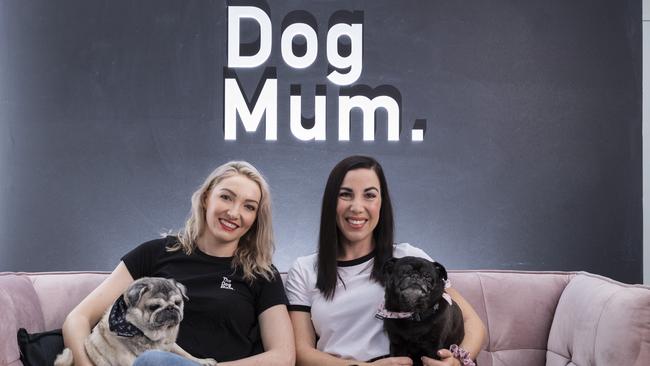
T-shirts with breed specific illustrations followed, then the Karanges’ bought the machinery needed to print designs. Then they bought the house next door in Acacia Ridge, on Brisbane’s southside, to print and pack.
Like the Muscle Nation crew, Karanges says The Dog Mum’s success is not just based on having sassy products that appeal particularly to the 20-40 age group, but building an online community.
It’s not enough to offer a new range … this generation wants to feel connected to the business they support. As she printed and packed into the night, Karanges replied to every message, every “Oh my dog, I love that!” post from passionate dog owners.
“This was built on an online community,” Karanges says.
“From the get-go that was my number one desire; to give people an experience they just wanted to be a part of and wanted to keep coming back for.”
When the first Covid lockdown came in March 2020, Karanges, who by then had two full-time employees and one casual, was about to hire a designer. She put that off. She didn’t need to. The Covid-19 phenomenon of dog worshipping was taking flight.
“It was like ‘boom’ by late March,” she says.
“Then by April it was going up and up.”
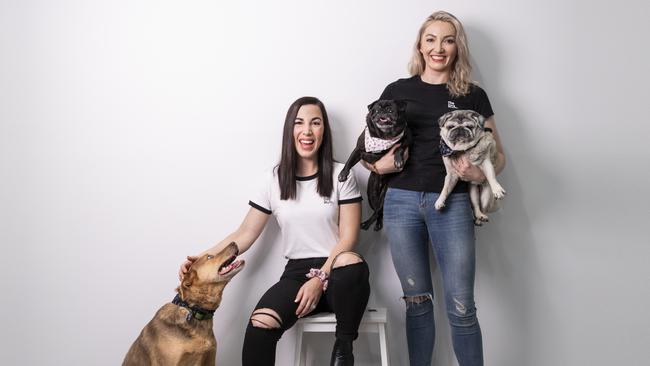
Robertson chimes in.
“The business in 2020 was up 40 per cent on the year prior.”
She knows these figures well. She pored over the books before doing what might be considered rash – buying a 50 per cent share of a business in the middle of a global pandemic.
When the two women met in 2020, their work/life balances were at different ends of the spectrum. Karanges, by then a mother to baby Hunter, now three, was working herself ragged. She knew The Dog Mum was at a crunch point where it either grew or plateaued.
She needed an investor.
Robertson’s life was cruisy; she was hanging out with her pugs, Niko and Frankie, learning French, spending time in Byron Bay and practising yoga. She was retired … at 31.
Over eight years, the QUT business graduate had taken the brand her late mother, Roza, had created, a range of sauces and dips trading as Roza’s Gourmet, and built it up to boast an annual turnover of $8m by 2018.
In September that year, she sold the company to Riviana, a subsidiary of SunRice, for an undisclosed sum.
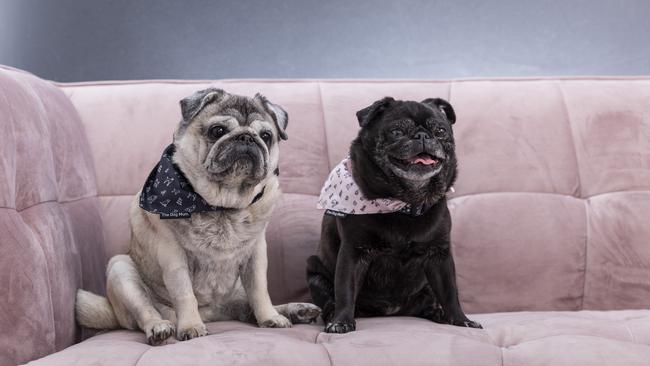
She had no intention of going back into business in 2020. She’d travel. But Covid-19 ended that.
“So now I wasn’t going to France to learn French, not going to party at Burning Man, not going to trek Patagonia, so what am I going to be doing in Brisbane?”
A mutual friend put Robertson in touch with Karanges in August 2020. By September, they were partners. “Fifty/fifty, in cash, into the business,” Robertson says.
“Emma wasn’t taking money off the table; everything goes towards growing the company together.”
Come November, they’d bought a commercial building at Seventeen Mile Rocks, in Brisbane’s southwest, sharing the space with DK Stainless. Neither was daunted by such a big investment in a pandemic.
“We needed to grow, I’d put this money into the business, let’s … buy an investment into the future,” Robertson says.
They devoted time last year to beefing up the business’s infrastructure by changing its digital marketing agency and website to accommodate growth. They’ve hired three people, including a designer and social media person, to have a staff of six.
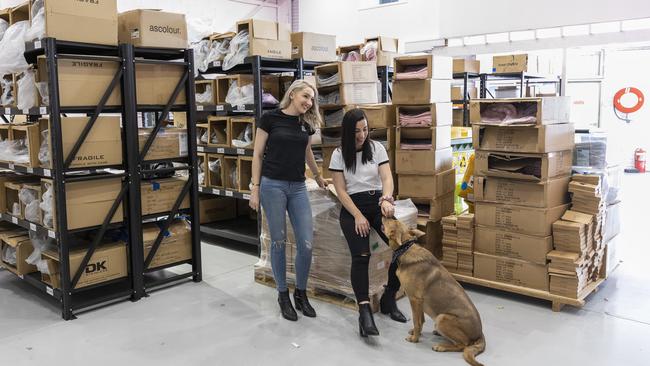
“Which made me proud,” Karanges says.
“Everyone was losing jobs and we were hiring.” The business’s turnover has tipped over $1m, with aggressive plans to hit double digits in four years.
To drive that, they’ve been developing a range of products, with Robertson keen to make The Dog Mum a one-stop shop for all the canine lover’s needs. Which means more products for dogs.
They launched their first range of collars and leads in August last year but it came with Covid-19 hurdles.
The rising cost of freight led to the decision to order 30 per cent via air freight and the balance by sea. The air freight arrived in time for the launch – the rest was about a month later.
But the pent-up demand led to impressive sales, up 70 per cent in the months of November and December compared with the previous year. Matching accessories for the dog mum and the dog have hit the mark.
Ecommerce is a hungry beast, Karanges says.
“If we don’t have something new every two weeks, our people are like, ‘Well, what else have you got?’”
Being able to print their own designs led to jaunty Covid-inspired slogans such as “Social distancing? You mean hanging at home with my dog” and their 53,000 Instagram followers and 23,000 Facebook devotees snapped them up.
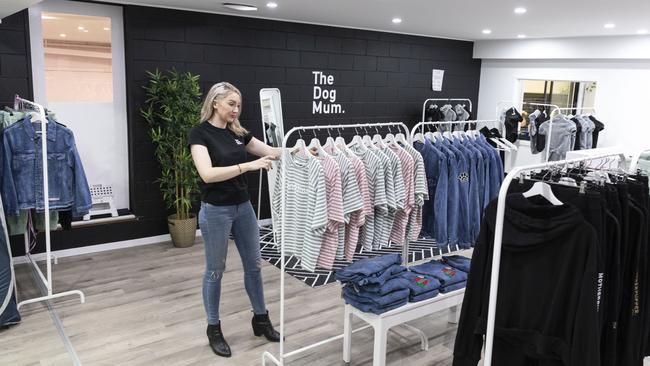
“We pretty much did that collection overnight,” Karanges says.
“We went, you know what, we’re either going to die or grow. And I choose grow. I still feel we’re just getting started. With Jaz and I, with our powers combined, just our drive, the way we push ourselves, I’m excited about where we can go.”
DOWN, THEN UP AND UP
For the first time in the short history of theonline training program company, Go1, it went backwards.
More and more contracts were being cancelled as businesses grappled with the initial March 2020 lockdown. Employees were heading home to an uncertain work life and “nice to have” offerings such as training were put on the backburner.
As April turned into May and revenue kept dropping, the four founders of the Logan-based Go1 – Andrew Barnes, 33, Chris Eigeland, 31, Vu Tran, 32 and Chris Hood, 39 – were starting to think about redundancies.
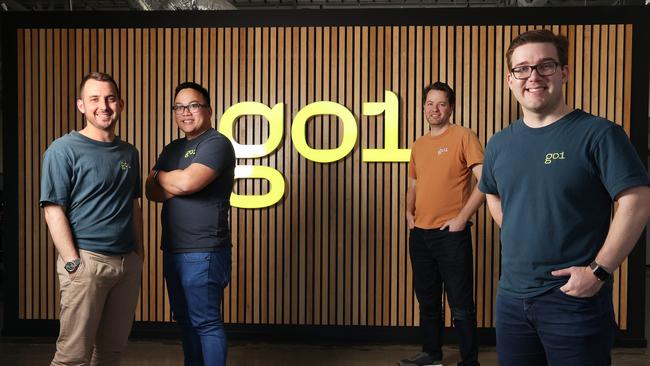
“We were looking at this,” CEO Barnes says, “and thinking, ‘Wow, everything has just fallen off a cliff’. I was thinking, ‘Is this ever going to stop? This could be it’.”
To add more spice, they were in the middle of a capital-raising round imperative to growing the business.
“No time like a global health and economic crisis to raise money,” Barnes jokes.
Then things turned. By mid-May, the capital raising was done and Madrona Venture Group, SEEK, Microsoft’s venture arm M12, Salesforce Ventures and Our Innovation Fund had invested $US40m (about $55m) in the company’s third capital raising round.
And businesses realised that online training was not an optional extra but a “must have” as Covid-19 restrictions made face-to-face programs difficult to offer.
“A lot of in-person programs had to pivot to an online variant and we were already set up,” Barnes says. “There was that growing awareness that people needed to continue to work and businesses needed to figure out how to reach people in a remote setting.”
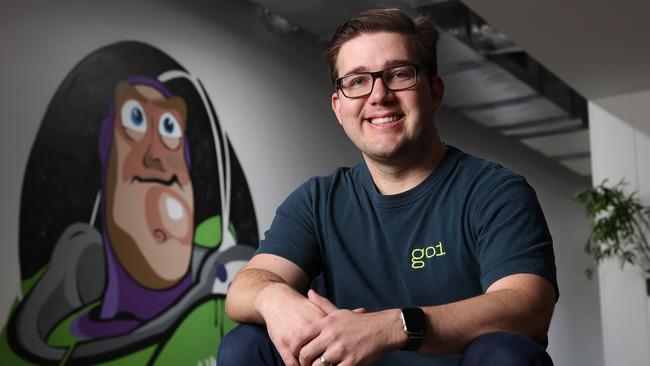
Go1 was waiting, with a library for subscribers of more than 200,000 training courses covering a host of industries, plus a swag of free courses.
Despite the three-month decline, Go1 bounced back, maintaining its record of doubling growth every year since it began in 2015.
Three of the four founders had gone to Cannon Hill Anglican College together and the other, Hood, became a friend after joining the trio’s website building company they’d set up while at school and uni.
They’d gone into different fields – Barnes studied accounting, Eigeland law and international relations, Tran medicine and Hood software engineering – but stayed in contact.
The tech-savvy mates had talked “in broad brushstrokes” about creating a training program aggregator, similar to the music streaming service Spotify, which pulled together training courses and provided access to a plethora of options under one subscription.
Barnes recalls waking up at 2am with the realisation that Y Combinator – a US-based seed money accelerator for startups which helped launch the likes of Airbnb and Dropbox – was closing its latest round of applications that day.
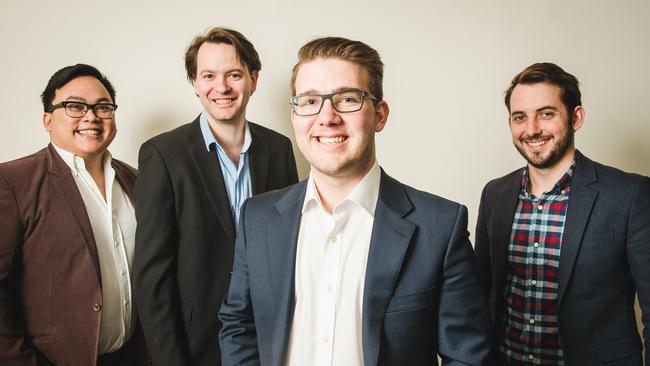
He got in contact with the other three, they pulled together a submission within four hours, and sent it off. A couple of weeks’ later, they were notified they’d made the shortlist of about 1000. Flights to San Francisco and accommodation were provided in exchange for their 10-minute pitch.
At the end of the day, they received an email. They were in, set to receive $US120,000 and access for three months to some top start-up brains to bring their idea to life.
“It was incredibly exciting,” Eigeland says. “Kind of surreal.”
Knockbacks followed. They’d contact content providers and ask them if they wanted to provide their programs.
The businesses would ask how many customers Go1 had.
“We’d say ‘none’ and they would not so politely tell us to get lost,” Barnes says.
The same happened with potential customers, who asked what courses they had. The answer was none – so the four men wrote the first eight courses.
“They were terrible but enough to get us going.”
Pre-pandemic, online training was growing at 20 per cent per year and Go1 was on to something. In 2018, it launched a Series A funding round, securing $US10m with SEEK the lead investor; the next year it raised $US30m, luring M12 to invest in an Asia Pacific start-up for the first time.
And last year, in the middle of a pandemic, having grown to be one of the world’s largest corporate education hubs, it raised $US200m to have the company valued at more than $US1bn.
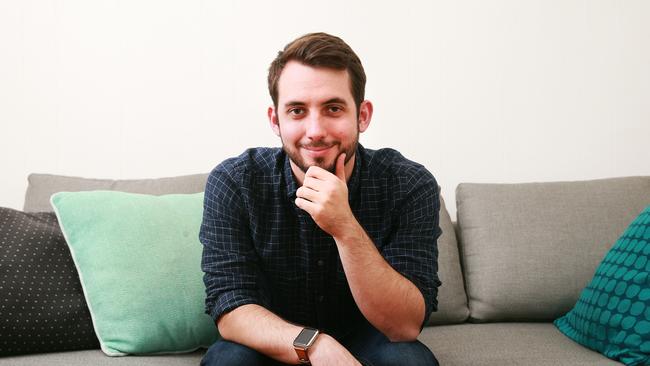
“We now have a library of courses from Harvard, Skillsoft, edX, Coursera, UNSW, Swinburne, names that people recognise,” Barnes says.
Go1 has 3.5 million users worldwide and offices in the US, UK, Vietnam, Malaysia, South Africa, and Singapore. “We started with four people in 2015 and we’ve now got 350 people employed in the business.”
Barnes says the pandemic accelerated the shift to online training. A big part of its success is that Go1 natively integrates with a range of tools being used in remote settings, such as Microsoft Teams, Slack and Workplace from Facebook.
“Take Zoom,” Eigeland says. “Adoption of video conferencing has skyrocketed; people are Slacking with each other here, then Zooming on their phone and we embed learning and training into those different tools.”
Barnes adds: “Being able to have one easy access to everything from compliance to mental health awareness to how to use a paper tape on Microsoft Excel in all of the applications that people are already using on a day-to-day basis has been a bit of a lightbulb moment for many organisations to go, actually, that’s super important.”
Machine learning and AI drive the platform, with data scientists helping clients access relevant courses. The company is starting to look into aggregating non-English speaking courses.
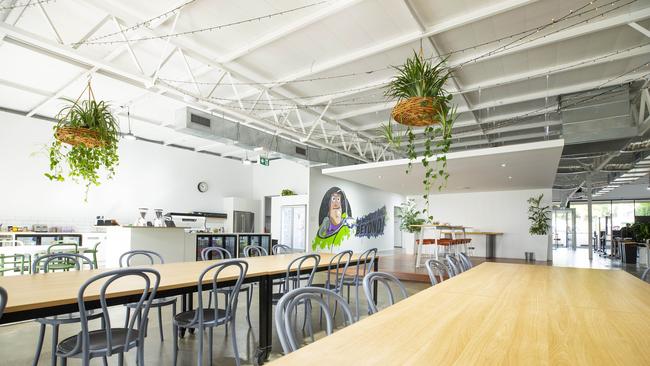
Now a fully-fledged unicorn – that rare thing of a $1bn start-up – Go1 has been fielding approaches to go public but says with the $200m injection, there’s no intention to do so yet. “The pathway we’re on will mean that it makes sense to go public … but there’s no need at present,” Barnes says.
After weathering the Covid storm, the plan is to double growth for at least the next two years.
“All the behaviours that Covid has prompted people to think through and realise are not going to change,” Barnes says.
“The importance of how do you allow people to learn wherever they are, in the office or not, is going to continue to be important.”
STRENGTH TO STRENGTH
Muscle Nation is powering on, installing anadvanced scanning system to handle the Covid-driven jump in orders, employing about 15 extra full-time staff and launching a line of supplement bars in Coles in July last year.
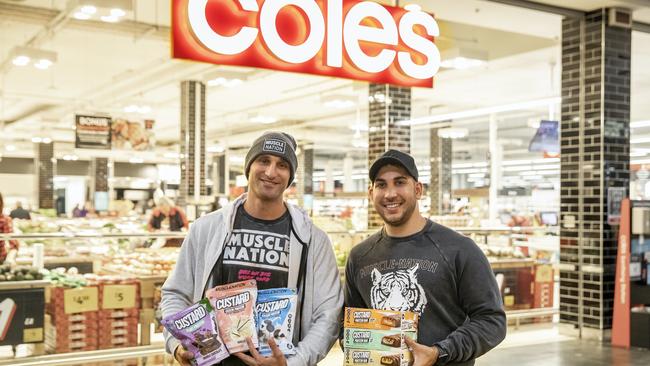
The company has already outgrown the warehouse it moved into in early 2019. A new one is currently being built.
“We were growing, but we didn’t expect the spike; it was definitely a spike,” Nathaniel Anthony says.
It came with challenges. Ordering the right amount of stock for an unprecedented boost in sales was tricky, particularly given the whimsies of freight deliveries. Most of Muscle Nation’s apparel is made in China.
“When you’ve got to go from ordering $100,000 worth of stock to a million dollars’ worth of stock, it’s a big jump.” The business had to factor in import and shipping costs of almost 10 times pre-Covid rates.
For a few months at the start of the pandemic, Muscle Nation stopped shipping overseas because orders were being delivered late, or not at all. Overseas expansion is a future goal but Anthony says the main aim is to “dominate Australia”. About 70 per cent of clients are Australian.
The entire time, social media was key. Muscle Nation has 698,000 followers on Instagram alone.
“We have about 10 people, just running customer service on social media,” says Anthony, an early-adopter who made millions in his early 20s by seeding advertising into his body building sites on Instagram.
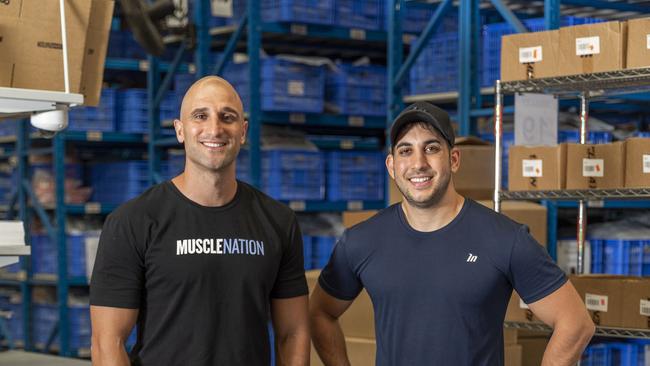
“We won’t leave any stone unturned; we will reply to everyone, not just as a company but more as a friend. It’s like this big community of like-minded people who are not only loving our products but loving being part of the journey as well.”
The importance of being hyper-responsive to clients is a strong theme among all these businesses, as is giving back.
Each of them devotes resources to social causes, with Go1 providing mental health courses for free, The Dog Mum launching a charity collection and donating to canine organisations, and Muscle Nation giving to a different charity every month.
At a time when physical connection was fraught, it was another way to connect with the community.
Now, as these young businesses push through into the “living with Covid” era, they are poised to emerge more engaged, more prepared and more focused than before.
Right product, right outlet helped. But so did that other quinella: energy and self-belief.
More Coverage
Originally published as ‘Our numbers skyrocketed’: The Qlders who made a fortune during the pandemic



